介词 prep
英语什么是介词分类及用法
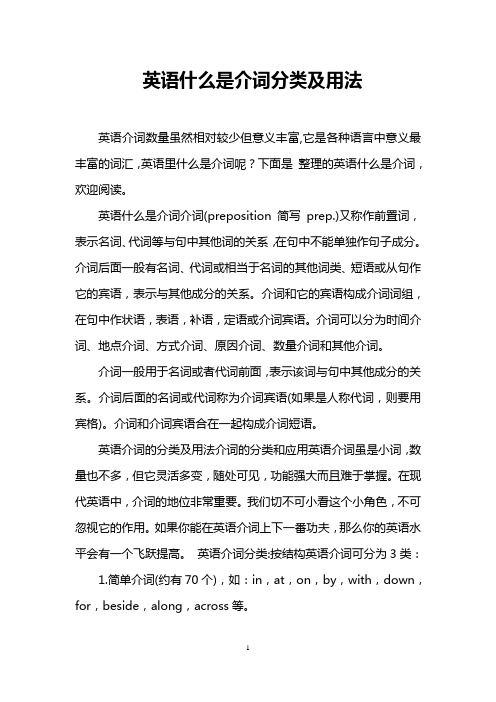
英语什么是介词分类及用法英语介词数量虽然相对较少但意义丰富,它是各种语言中意义最丰富的词汇,英语里什么是介词呢?下面是整理的英语什么是介词,欢迎阅读。
英语什么是介词介词(preposition 简写prep.)又称作前置词,表示名词、代词等与句中其他词的关系,在句中不能单独作句子成分。
介词后面一般有名词、代词或相当于名词的其他词类、短语或从句作它的宾语,表示与其他成分的关系。
介词和它的宾语构成介词词组,在句中作状语,表语,补语,定语或介词宾语。
介词可以分为时间介词、地点介词、方式介词、原因介词、数量介词和其他介词。
介词一般用于名词或者代词前面,表示该词与句中其他成分的关系。
介词后面的名词或代词称为介词宾语(如果是人称代词,则要用宾格)。
介词和介词宾语合在一起构成介词短语。
英语介词的分类及用法介词的分类和应用英语介词虽是小词,数量也不多,但它灵活多变,随处可见,功能强大而且难于掌握。
在现代英语中,介词的地位非常重要。
我们切不可小看这个小角色,不可忽视它的作用。
如果你能在英语介词上下一番功夫,那么你的英语水平会有一个飞跃提高。
英语介词分类:按结构英语介词可分为3类:1.简单介词(约有70个),如:in,at,on,by,with,down,for,beside,along,across等。
2.分词介词(约15个)如:during,following,considering,regarding,speaking,judging,talking等。
3.成语介词(约有500个)如:out of,apart from(除之外:别无、尚有),because of,by means of用、依靠等。
按意义英语介词可分为3类:1. 时间介词,如:at, on, in, during, over, from, for, until等。
2. 地点介词,如:at, on, in, across, to, over, between, inside, outside等。
考研-常见介词用法总结
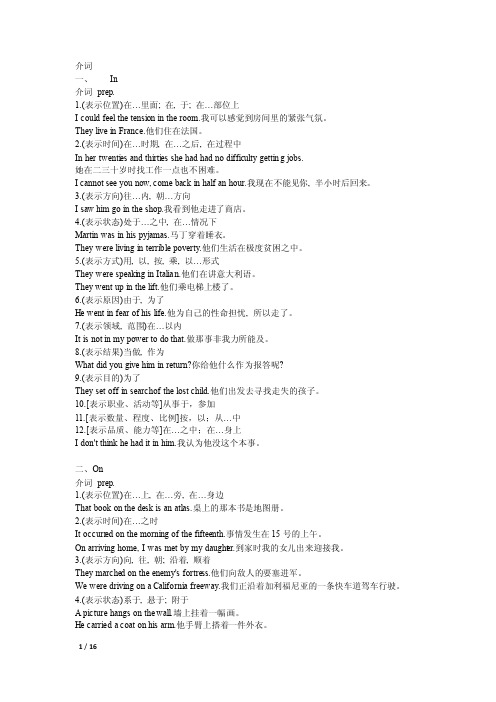
介词一、In介词prep.1.(表示位置)在…里面; 在, 于; 在…部位上I could feel the tension in the room.我可以感觉到房间里的紧张气氛。
They live in France.他们住在法国。
2.(表示时间)在…时期, 在…之后, 在过程中In her twentie s and thirtie s she had had no difficu lty getting jobs.她在二三十岁时找工作一点也不困难。
I cannotsee you now, come back in half an hour.我现在不能见你, 半小时后回来。
3.(表示方向)往…内, 朝…方向I saw him go in the shop.我看到他走进了商店。
4.(表示状态)处于…之中, 在…情况下Martinwas in his pyjamas.马丁穿着睡衣。
They were livingin terribl e poverty.他们生活在极度贫困之中。
5.(表示方式)用, 以, 按, 乘, 以…形式They were speakin g in Italian.他们在讲意大利语。
They went up in the lift.他们乘电梯上楼了。
6.(表示原因)由于, 为了He went in fear of his life.他为自己的性命担忧, 所以走了。
7.(表示领域, 范围)在…以内It is not in my power to do that.做那事非我力所能及。
8.(表示结果)当做, 作为What did you give him in return?你给他什么作为报答呢?9.(表示目的)为了They set off in searchof the lost child.他们出发去寻找走失的孩子。
英语语法----介词Preposition(Prep.)
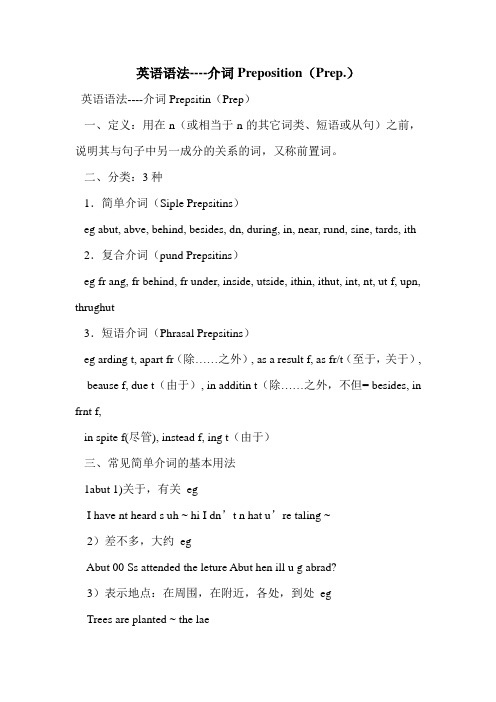
英语语法----介词Preposition(Prep.)英语语法----介词Prepsitin(Prep)一、定义:用在n(或相当于n的其它词类、短语或从句)之前,说明其与句子中另一成分的关系的词,又称前置词。
二、分类:3种1.简单介词(Siple Prepsitins)eg abut, abve, behind, besides, dn, during, in, near, rund, sine, tards, ith 2.复合介词(pund Prepsitins)eg fr ang, fr behind, fr under, inside, utside, ithin, ithut, int, nt, ut f, upn, thrughut3.短语介词(Phrasal Prepsitins)eg arding t, apart fr(除……之外), as a result f, as fr/t(至于,关于), beause f, due t(由于), in additin t(除……之外,不但= besides, in frnt f,in spite f(尽管), instead f, ing t(由于)三、常见简单介词的基本用法1abut 1)关于,有关egI have nt heard s uh ~ hi I dn’t n hat u’re taling ~2)差不多,大约egAbut 00 Ss attended the leture Abut hen ill u g abrad?3)表示地点:在周围,在附近,各处,到处egTrees are planted ~ the laeThe live sehere~ the Peple’s SquareDn’t leave ur bs~ ur des I haven’t an sall hange ~/n e 4)“即将”(近期将)egThe fil is ~ t begin It’s nearl 7:00 The train is ~ t leave2abve 1)在……上方egA bird is fling abve the ds There is a prtrait abve the blabard 2)(在数量上)超过egThe an is nt et frt, but ell ~thirtThe nuber f ne Ss this ear is ~fur hundred3)(能力等)胜过,超越;因太困难、太好而不…… eg The prble is ~ e (这问题太难我不懂。
英语语法----介词Preposition(Prep.)

英语语法----介词Preposition(Prep.)英语语法----介词Prepsitin(Prep)一、定义:用在n(或相当于n的其它词类、短语或从句)之前,说明其与句子中另一成分的关系的词,又称前置词。
二、分类:3种1.简单介词(Siple Prepsitins)eg abut, abve, behind, besides, dn, during, in, near, rund, sine, tards, ith 2.复合介词(pund Prepsitins)eg fr ang, fr behind, fr under, inside, utside, ithin, ithut, int, nt, ut f, upn, thrughut3.短语介词(Phrasal Prepsitins)eg arding t, apart fr(除……之外), as a result f, as fr/t(至于,关于), beause f, due t(由于), in additin t(除……之外,不但= besides, in frnt f,in spite f(尽管), instead f, ing t(由于)三、常见简单介词的基本用法1abut 1)关于,有关egI have nt heard s uh ~ hi I dn’t n hat u’re taling ~2)差不多,大约egAbut 00 Ss attended the leture Abut hen ill u g abrad?3)表示地点:在周围,在附近,各处,到处egTrees are planted ~ the laeThe live sehere~ the Peple’s SquareDn’t leave ur bs~ ur des I haven’t an sall hange ~/n e 4)“即将”(近期将)egThe fil is ~ t begin It’s nearl 7:00 The train is ~ t leave2abve 1)在……上方egA bird is fling abve the ds There is a prtrait abve the blabard 2)(在数量上)超过egThe an is nt et frt, but ell ~thirtThe nuber f ne Ss this ear is ~fur hundred3)(能力等)胜过,超越;因太困难、太好而不…… eg The prble is ~ e (这问题太难我不懂。
英语语法----介词Preposition(Prep.)
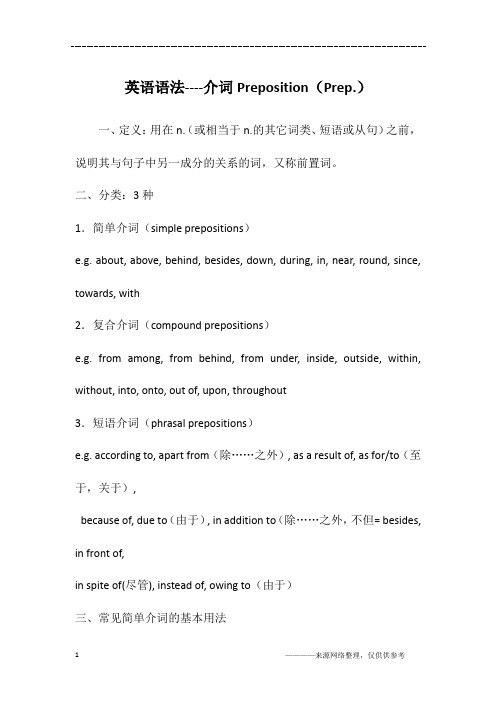
英语语法----介词Preposition(Prep.)一、定义:用在n.(或相当于n.的其它词类、短语或从句)之前,说明其与句子中另一成分的关系的词,又称前置词。
二、分类:3种1.简单介词(simple prepositions)e.g. about, above, behind, besides, down, during, in, near, round, since, towards, with2.复合介词(compound prepositions)e.g. from among, from behind, from under, inside, outside, within, without, into, onto, out of, upon, throughout3.短语介词(phrasal prepositions)e.g. according to, apart from(除……之外), as a result of, as for/to(至于,关于),because of, due to(由于), in addition to(除……之外,不但= besides, in front of,in spite of(尽管), instead of, owing to(由于)三、常见简单介词的基本用法1.about 1)关于,有关e.g.i have not heard so much ~ him. i don’t know what you’re talking ~. 2)差不多,大约e.g.about 500 ss attended the lecture. about when will you go abroad?3)表示地点:在周围,在附近,各处,到处e.g.trees are planted ~ the lake.they live somewhere~ the people’s square.don’t leave your books~ your desk. i haven’t any small change ~/on me.4)“即将”(近期将来)e.g.the film is ~ to begin. it’s nearly 7:00. the train is ~ to leave.2.above 1)在……上方e.g.a bird is flying above the woods. there is a portrait above the blackboard. 2)(在数量上)超过e.g.the man is not yet forty, but well ~thirty.the number of new ss this year is ~four hundred.3)(能力等)胜过,超越;因太困难、太好而不……e.g.the problem is ~ me. (这问题太难我不懂。
(完整版)方位介词---附习题及参考答案
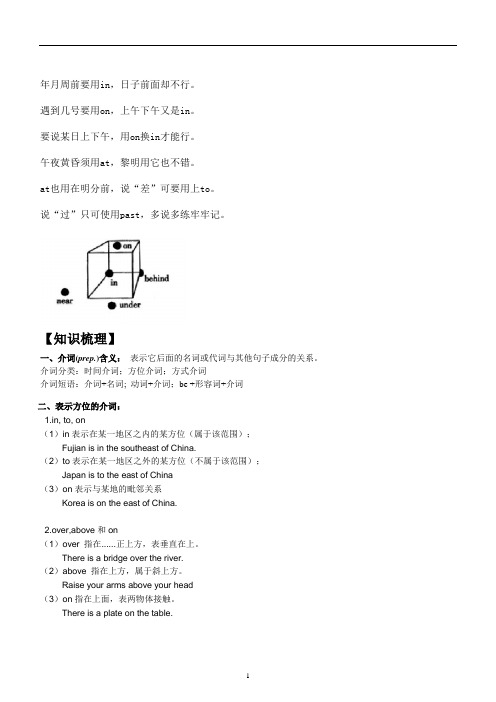
年月周前要用in,日子前面却不行。
遇到几号要用on,上午下午又是in。
要说某日上下午,用on换in才能行。
午夜黄昏须用at,黎明用它也不错。
at也用在明分前,说“差”可要用上to。
说“过”只可使用past,多说多练牢牢记。
【知识梳理】一、介词(prep.)含义:表示它后面的名词或代词与其他句子成分的关系。
介词分类:时间介词;方位介词;方式介词介词短语:介词+名词; 动词+介词;be +形容词+介词二、表示方位的介词:1.in, to, on(1)in表示在某一地区之内的某方位(属于该范围);Fujian is in the southeast of China.(2)to表示在某一地区之外的某方位(不属于该范围);Japan is to the east of China(3)on表示与某地的毗邻关系Korea is on the east of China.2.over,above和on(1)over 指在......正上方,表垂直在上。
There is a bridge over the river.(2)above 指在上方,属于斜上方。
Raise your arms above your head(3)on指在上面,表两物体接触。
There is a plate on the table.3.at,in和on的用法区别(1)at 表示较小的地方。
at the bus stop, at home(2)in 表示较大的地方。
in China, in the world(3)on 表示在一个平面上。
on the table4.(1) in front of在......之前(范围外)。
There are some trees in front of the classroom(2) in the front of表示“在......的前部”(范围内)Our teacher usually sits in the front of the classroom.(3)before所表示的位置关系和in front of 通用,表示“在......前”,“在......面前”5.below,under(1)below表示“在下方或位置低于......”,不一定有垂直在下之意;(2) under表示“在......正下方”。
介词的多种解释
inprep.(表示位置)在…里面; 在, 于; 在…部位上;(表示时间)在…时期, 在…之后, 在过程中;(表示方向)往…内, 朝…方向;(表示状态)处于…之中, 在…情况下;(表示方式)用, 以, 按, 乘, 以…形式;(表示原因)由于, 为了;(表示领域, 范围)在…以内;(表示结果)当做, 作为;(表示目的)为了adv.进入, 入内;在家, 在里面;到达, 来临;当政, 当选;正当时令, 正当流行onprep.(表示位置)在…上, 在…旁, 在…身边;(表示时间)在…之时;(表示方向)向, 往, 朝; 沿着, 顺着;(表示状态)系于, 悬于; 附于;(表示方式)乘, 坐, 骑;(表示原因)由于, 因为;(表示对象)对, 对于, 碰在, 对…造成困难;(表示比较)与…相比;(表示方位)在…方位adv.(放, 穿, 连接)上;向前, (继续)下去atprep.(表示位置) 在, 于; 到达, 达到; 经, 由; 在…旁, 靠近; 在…里; 在…上; 在…方位;(表示时间)在, 在…时刻[时辰, 期间, 阶段, 时节]; 在…岁时;(表示方向)在…方面(表示状态)处于…状态, 在…情况下;(表示方式)以…的方式; 通过一次…的动作;(表示原因)因为, 由于; 由于有, 由于应…;(表示距离)从, 在距离…处;(表示目标)朝, 向, 对着;(表示环境)出席, 参加;withprep.(表示关系)和…在一起;(表示状态)具有, 带有;(表示方式)用, 以, 藉;(表示对象)对…, 关于;(表示伴随)与此同时, 随着;(表示让步)虽然, 尽管;(表示原因)由于, 因为;(表示态度)支持, 赞同;(表示态度)跟(…对抗) ofprep.(表示时间)在…的, 在…之前; 在…期间;(表示方式)根据;(表示对象)对于, 就…而言;(表示原因)由于, 因为;(表示结果)在…方面;(表示目的)用于…的;(表示方位)在; 位于;(表示范围)在…之中;(表示否定)缺乏, 没有forprep.(表示时间)在(某一特定时间); 在…时节; 持续达;(表示对象) 替, 帮, 给, 为…做准备, 对, 对于,对…来说, 在…一方;(表示原因)因为, 由于, 作为…的结果;(表示结果)当做, 作为, 作为…的部分, 就…的条件而言;(表示目的)为了…, 适用于;(表示方向)向, 朝, 开往;(表示距离)延续达, 计有;(表示态度)支持, 赞同, 想要;(表示比率)按…比例, 以…价格, 第…次conj.因为, 由于byprep.(表示位置)在…近旁; 在身边;(表示时间)不迟于; 在…时候;(表示方向)从…中经过;(表示方式)搭乘, 通过; 抓住…; 靠, 采取; 就…而论; 以…称呼方式; 以…的名义; 凭着;(表示原因)随…而来;(表示环境)借着…光亮;(表示关涉)经过;(表示方位)偏于;(表示程度)以…之差adv.在近旁;经过, 走过;保留aboutprep.(表示位置)在…周围; 在…的各处; 在…的附近;(表示对象)对, 对于;(表示原因)由于, 因为;(表示论及)关于; 涉及; 在…方面;(表示所属)属于, 体现在…身上;(表示过程)忙于, 从事;(表示伴随)在身边adv.大约, 差不多;在四周, 处处;在附近withoutprep.(表示否定)无, 没有;(表示位置)在外面;(表示伴随)在没有…的陪伴下, 在不附带…的情况下。
prep.
Preposition
介词 ( preposition )
一 介词的分类与语法功能 1.介词是虚词, 不能单独做句子成分, 必须与名词、 代词( 或相当于名词的其他词类、短语、或从句 ) 构成介词短语,在句子中充当一个成分。 介词分为: 简单介词: at 、 in 、 on 、for 、 to 合成介词: within 、 inside 、 onto、 throughout . 短语介词: according to 、 out of 、 because of、 by means of、 in spite of 、 instead of
by Eggs are sold ______ the dozen.
九、in the end, at the end of, by the end of: in the end作“最后”、“终于”解,可单独使用, 后不接介词of; at the end of 表示“在……末梢”,“到……尽 头”,既可指时间,也可以指地上或物体。不 可单独使用; by the end of 作“在……结束时”,“到……末 为止”解,只能指时间。不可单独使用。 如:In the end they reached a place of safety. At the end of the road stands a beautiful garden. They decided to have an English evening at the end of this week. By the end of last month he had finished the novel.
between He divided the sweets ____________ L Nl, L Cl and Y Mh.
英语介词
介词:介词英文缩写是prep.是英文preposition的缩写。
介词是一种用来表示词与词、词与句之间的关系的虚词,在句中不能单独作句子成分。
介词后面一般有名词代词或相当于名词的其他词类,短语或从句作它的宾语。
介词和它的宾语构成介词词组,在句中作状语,表语,补语或介词宾语。
介词可以分为时间介词、地点介词、方式介词、原因介词和其他介词。
1.表示地点位置的介词1)at ,in, on, to,forat (1)表示在小地方; (2)表示“在……附近,旁边”in (1)表示在大地方; (2)表示“在…范围之内”。
on 表示毗邻,接壤,“在……上面”。
to 表示在……范围外,不强调是否接壤;或“到……”2)above, over, on 在……上above 指在……上方,不强调是否垂直,与below相对;over指垂直的上方,与under相对,但over与物体有一定的空间,不直接接触。
on表示某物体上面并与之接触。
The bird is flying above my head. There is a bridge over the river. He put his watch on the desk.3)below, under 在……下面under表示在…正下方below表示在……下,不一定在正下方There is a cat under the table. Please write your name below the line.4)in front [frant]of, in the front of在……前面in front of…意思是“在……前面”,指甲物在乙物之前,两者互不包括;其反义词是behind (在……的后面)。
There are some flowers in front of the house.(房子前面有些花卉。
) in the front of 意思是“在…..的前部”,即甲物在乙物的内部.反义词是at the back of…(在……范围内的后部)。
词性--介词
词性--介词介词(prep.):表示它后面的名词或代词与其他句子成分的关系。
如in, on, from, above, behind1、介词的主要用法:介词是一种虚词,不能独立使用。
介词之后一般有名词或代词(宾格..)或相当于名词的其他词类、短语或从句作它的宾语,即构成介词短语。
有些介词是由两个以上的词构成的短语介词,如:out of(从…中出来), because of(因为), away from(距离…), on top of(在…顶上), ever since(自从…), next to(在…隔壁), according to(根据…), in front of(在…前方)等。
2)above在…前, about在…附近, across在…对面, after在…后面, against 倚着..., along在…近旁, among在…中间, around在…周围, round在….周围, at在…处, before 在...前, behind在...后, below低于..., beside在...旁边, between在...之间, by在...旁, down在...下面, from来自..., in在...里面, inside在...里面, near靠近..., of在...之中, on在...上面, out of在...之外, outside在....外面, over在....上方, under在...下方, up在...上面, on top of在...顶部, in靠近..., in the middle of在...的中间, at the end of在...的末端,等等。
across横越..., against对抗..., along沿着..., around绕着..., round环绕..., at朝着..., behind向…后面, etween…and…从…到...,by路过/通过..., down向…下, for向..., from从/离..., in进入..., into进入..., inside到...里面, near接近..., off脱离/除..., on向...上, out of 向...外, outside向....外, over跨过..., past经过/超过..., through穿过..., to向/朝..., towards朝着..., on to到...上面, onto到...上面, up向...上, away from远离...about大约..., after在…以后, at在… (时刻), before在…以前, by到…为止, during 在…期间, for有…(之久), from从…(时)起, in在(上/下午);在(多久)以后, on在(某日), past过了…(时), since自从…(至今), through 贯穿…(期间), till直到…时, until直到…时, to到(下一时刻), ever since从那时起至今,at the beginning of在...开始时,at the end of在...末, in the ...当中,at the time of在...时as作为/当作..., by用/由/乘坐/被..., in用…(语言), like与…一样, on骑(车)/徒(步),通过(收音机/电视机), over通过(收音机), through通过..., with用(材料),用(手/脚/耳/眼),without没有…about关于..., except除了…, besides除了…还... for对于/就…而言, in在…(方面), of…的,有关..., on关于/有关..., to对…而言, towards针对..., with就…而言其它介词:【目的介词】for为了..., from防止…, to为了…【原因介词】for因为..., with由于…, be cause of因为...【比较介词】as与…一样,like象…一样,than比...,to与…相比, unlike与…不同【伴随/状态介词】against和…一起(比赛),at在(上班/休息/上学/家,etc.),in穿着…(衣服/颜色),into变成...,on在(值日), with与…一起,有/带着/长着..., without没有/无/不与…一起3、介词短语的句法作用:介词短语相当于一个形容词或副词,可用作状语、定语和表语。
- 1、下载文档前请自行甄别文档内容的完整性,平台不提供额外的编辑、内容补充、找答案等附加服务。
- 2、"仅部分预览"的文档,不可在线预览部分如存在完整性等问题,可反馈申请退款(可完整预览的文档不适用该条件!)。
- 3、如文档侵犯您的权益,请联系客服反馈,我们会尽快为您处理(人工客服工作时间:9:00-18:30)。
汉语中的“对”,英语中除了to以外还有about, after, at, for, in, of, on, over, with等;汉语中的“的”,英语中除了of以外还有about, against, for, from, in, over, to等汉语中的“用”,英语中除了with以外还有against, at, by, from, in, of ,on等下面是一些英语中对空间的看法的用法,大熊猫产在中国:Giant pandas are native to China.那些学生都住在校园里:T hose students live on the school campus.那位老师在见习中:That teacher is on the probation.他们在董事会里:They are on the board.今天剧院里演什么戏? What’s on at the theatre?军队在城里实行了宵禁:The army imposed a curfew on the city.请务必把我买的东西记在我的帐里:Please charge these purchases on/to my account.物价在上涨之中:Prices are on the increase.犯罪率在下降之中:The crime rate is on the decrease.我在休闲中看小说:I read novels at my leisure.问题在讨论中:The issue is under discussion.我的表还在保修期内/中: My watch is still under the warranty.他们在旅行中:They are on their travel.那对新婚夫妇在度假中:The newly married couple is on holiday now.他们在工作中出了事故:They had an accident at work.请先读书的前言:Please read the preface to the book first.这是文件的附件:This is the annex to the document.这是暴风雨的前兆:This is a prelude to the storm.愿望是思想之父:The wish is the father to the thought.他是王位的继承人:He is the heir to the throne.他是我的代理人:He is the deputy for me 驻某机构的代表:a deputy to an organization 谁是被告的律师?Who is the counsel for the defendant?这是止疼的处方:This is the prescription for pain-killing.他有一张800元的支票:She has a coequal/check for 800 Y uan.他付了买家具的定金:He has paid a deposit on furniture.剧院的出口在哪里?Where is the exit from the theatre?他写了一篇关于经济的论文:He has written an essay on/about economy.布朗教授是美国文学的权威:Professor Brown is an authority on American Literature.某事的根据:An authority for sth. 对某人某事的支配权:An authority over sb/sth我有一本语法方面的书:I have a book on grammar.她是新娘的伴娘:She is the attendant on/upon the bride.这是吸烟的禁令:This is a ban of smoking.他已获得建筑学的文凭:he has got a diploma in architecture.他是打银器的能手:he is a master at silver-smitting.我们已经采取了很多疾病的预防措施:We have taken a lot of precautions against diseases. “用”字的译法用腿走路:walk on one’s legs用眼睛看:look at one’s eyes用耳朵听:listen to one’s ear用鼻子闻:smell with one’s nose用嘴吃:eat with one’s mouth用手拿:take with one’s hand我用低价买了几本书:I have bought several books at low price.我用支票支付的:I have paid for it by check.请用自己的话说:Please say i t in your own words.我常用英语写信:I often write letters in English.这些衣服使用毛料制成的:these clothes are made in wool.这张桌子是用石头做成的:This table is made of stone.这酒使用葡萄酿制的:This kind of wine is made from grapes.英语中“对”字的翻译我们对世界形势很担心:we are anxious about the world situation.他对死亡很害怕:He is afraid/fearful/apprehensive of death.他一点都没生气:He is not angry with me at all.应某事对某人生气:be angry with sb. Fo r sth; 对某事生气:be angry at/abou t sth.别对孩子发怒:Don’t be furious with your children.你对他的话有怀疑吗?Are you doubtful about/of his words.他对危险不敏感:He is insensible of the danger.你对你说的话有把握吗?Are you certain of your words.他们对总统的政策不信任:They were distrustful of the President’s policy.小学生对老师感到敬畏:The pupils are awe of their teachers.他对妻子不满:He is displeased with his wife.对某事失望be displeased at sth.父亲对他的孩子感到失望:The father is disappointed with his children.因没有做成某事失望be disappointed at/about (doing) sth.因希望等没有实现be disappointed of one’s hope/expectation我们对祖国感到自豪:We are proud of our motherland.为某人某事感到自豪take (a) pride in sb./sth. Pride oneself on sb./sth.否定用法1.不定代词做主语时,英语中否定主语,汉语中否定谓语例:任何人都做不好这个工作:No one can do it well.任何人都不准进来:Nobody is allowed to come in.2.表示决不时,英语习惯否定状语,而汉语则否定谓语例:在任何情况下我都不会做这种事On no condition will I do such a thing. 倒装结构在任何情况下我们都不该指责他In no way should we blame him.在任何情况下我都不会撒谎Under no circumstances shall I tell a lie.3.汉语否定词在从句中而英语否定词在主句中例:我们认为他不是小偷We don’t believe that he is a thief.我想小孩子没有病I don’t suppose that the children is ill.我认为他不喜欢咖啡I don’t figure that he likes coffee.并非所有表示看法的词都能用于否定转移的结构,有事否定在主句和从句的意义不一样。
1. 使用动词hope时不能使用否定转移。
例如,我希望今天不会下雨I hope that it won’t rain toda y√不能说I don’t hope that it will rain today.2. 当wish的宾语为不定式时可以否定转移,当其宾语为一个从句时则无否定转移例如,我不愿贫穷 I wish not to be poor/ I don’t wish to be poor.汉英部分否定和完全否定的用法汉语中用“两个都不,所有的都不”表达完全否定,用“并非都、并非两个都”表达部分否定。
英语中用“none of…, neither of…, no…or…”表达全部否定,用“all…not…, both…not…, no…and…”表达部分否定。
例如:所有的答案都不对 None of the answers is right.错误译法并非所有答案都对所有的人都没来 None of the people has come. 并非所有人都来了两台机器都不好 Neither of the machines is good. 并非两台机器都好我没有钢笔和铅笔 I have no pen or pencil. 我并非钢笔和铅笔都有英语中的形式主语it和汉语中的谓词性主语用法对比汉语中谓词性词语包括动词、形容词、谓词性的代词、形容词性的短语、动词性短语等。
这是以动作、形状或事情做称述的对象,这种句子可以叫谓语主语句。
英语中没有谓词性主语,当遇到汉语的谓词性主语时,英语需要用形式主语打头,用动词不定式短语做真正的主语。
例如吃饭是必不可少的It is indispensable to eat.做这种比较是令人生气的It’s offensive to do such comparison.那么说是不对的It’s incorrect to say that.喝太多酒是有害健康的It is detrimental to health to drink too much wine.看到这么干净的街道真令人惊讶It’s remarkable to see such clean streets.。
